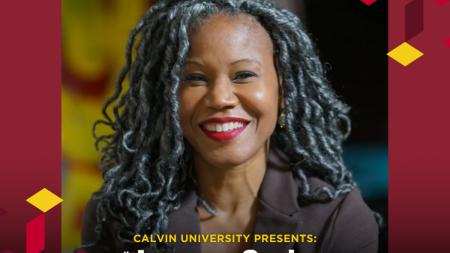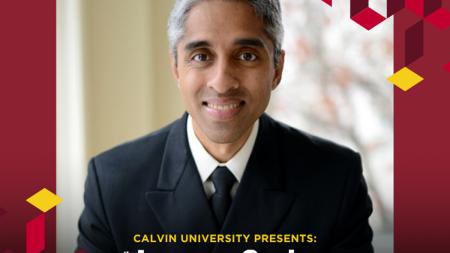A Time for Lament

Author, church planter, and scholar Soong-Chan Rah believes churches are missing an opportunity during the COVID-19 pandemic.
Instead of pouring efforts into upgrading video and audio systems so that congregations can go online and replicate normal, traditional services, why not use our resources to create fresh ways of evangelism, especially with our neighbors? said Rah in a Zoom presentation Dec. 10 sponsored by Vibrant Congregations, the Center for Church Renewal, Calvin Theological Seminary, and the Healthy Church Discernment Process.
“If you go back to the traditional service only, you are ministering to those who are already in your church. What about those who don’t come to church — and may never really want to attend a church — but are lonely and in need?” he asked.
Rah admitted, though, that being creative in church life can be hard when so much has been going on. While this can be a time for a renewed vision for the church, the circumstances we have all confronted in 2020 can wear us down.
“We are living in a time period that is unprecedented. Every century has crisis moments. But this has to be the first time when so much has happened in one year,” said Rah, who teaches church growth and evangelism at North Park Theological Seminary in Chicago.
The COVID-19 pandemic alone would be hard. However, we have also been facing a deep economic downturn and substantial racial and political unrest.
“This is the craziest year in my lifetime, to be sure,” Rah told the more than 50 participants in the Zoom presentation. “I know I have been hollowed out and rubbed down. All of the strength has been scooped out of me.”
Early in the pandemic two of his students, one of whom he was particularly close to, died of COVID-19, bringing home the devastating effect this virus has on people. “This thing is deadly. It is not a hoax.”
As a pastor, Rah asked himself, What is the proper response during this pandemic? His answer: Even though you feel tired and beat up, even though you can feel deflated and even hopeless, you still have a job to do.
“Our experiences don’t take away our call to be ministers of the gospel,” said Rah. “We may not feel up to the call right now, but we are called to be prophets, servants, and ministers.”
Pastors must ask themselves how they fulfill these roles.
Rah said it starts with being willing to step into the pain and suffering around them — and inside themselves as well. And as hard as that can be, there is a biblical precedent to follow.
“It is a matter of lamentation such as that recounted in Lamentations 1, which relates the social reality of pain and suffering [among the Jewish people] . . . at that time,” he said.
Written during the Jewish exile to Babylon soon after the destruction of Jerusalem, Lamentations 1:1 reads: “How deserted lies the city, once so full of people! How like a widow is she, who once was great among the nations! She who was queen among the provinces has now become a slave.”
Lamentations is a book that many churches tend to ignore, given its troubling, somber content. It is not uplifting. But now is a time to focus on it, said Rah.
“The great city of Jerusalem had been torn down, and many had gone into exile in Babylon. It was a devastating moment in the history of God’s people in the Old Testament.
“This was the harshest and most extreme punishment God could give. And we know today what it is like to have everything fall apart,” he said.
Author of the book Prophetic Lament: A Call for Justice in Troubled Times, Rah was a speaker at Inspire 2019, the CRC’s binational gathering for pastors, leaders, volunteers, and others serving in church ministry. In his presentation there Rah spoke about the necessity of lament, without which we cannot bring the full range of our emotions and concerns before God.
Speaking on the Zoom webinar, Rah told attendees that they have three options in response to all that has been happening this year, especially in the United States.
“You can run away and hide. You can give up and give in — or you can lament . . . [and accept what is going on],” he said.
The prophet Jeremiah, who is likely the author of Lamentations, “reminded God’s people that they could be in the most challenging circumstance you could imagine — everything that was evil in the world was in Babylon — but even then . . . they remained God’s people and could seek to express God’s shalom (peace).”
Many of us might feel as if we are in “a spiritual Babylon today,” he said. “There is civil unrest. We face challenges to budgets. We feel ourselves in a place of real brokenness. There is place after place where we see deaths due to COVID-19.”
But we don’t give up. Instead we seek to comfort one another as well as to look to the future and seek creative ways for the church to express itself. We can use our imaginations to picture a new church, a new heaven and new earth, said Rah.
“We need to ask, ‘What is God’s will in the midst of this? How do we best communicate the gospel?’ I believe there are many people outside of churches who . . . are open to new ways of doing community.”
What if, he asked, the loud, conflicting voices coming from our churches in 2020 quieted down and instead we “listened to the poor and spoke on their behalf instead of making so much noise?”
It’s necessary in this time of crisis to face our hardships and challenges full-on, Rah said. “We need to practice compassion as a church on a consistent basis.”
This time of crisis, Rah said, offers more opportunity to “practice compassion and find justice for ‘the least of these.’” The question to ask, Rah added, is, “How can this crisis help us live into this new way?”


